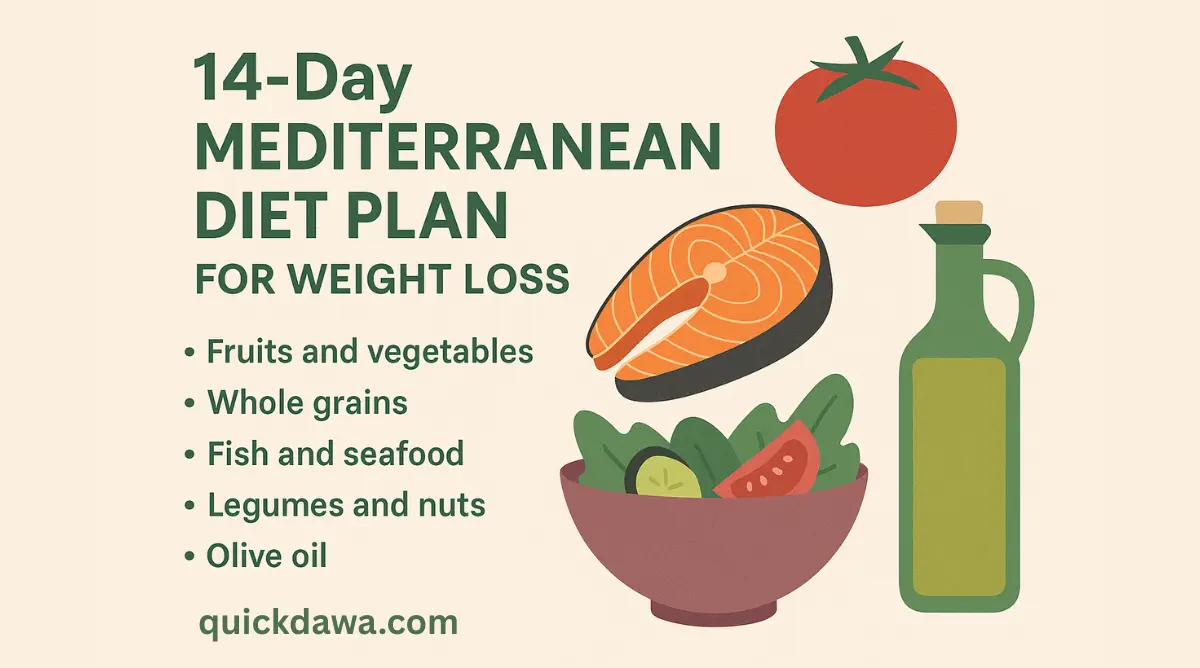14-Day Mediterranean Diet Plan for Weight Loss
The Mediterranean Diet has long been hailed as one of the healthiest diets in the world. Inspired by the traditional eating habits of countries bordering the Mediterranean Sea—like Greece, Italy, and southern France—it emphasizes whole foods, healthy fats, and a balanced approach to nutrition.
In this 14-day Mediterranean Diet plan for weight loss, you’ll discover how to eat delicious, satisfying meals that promote fat loss and better health.
🌿 What is the Mediterranean Diet?
The Mediterranean Diet is not a strict set of rules but a flexible eating pattern. It is characterized by:
- High consumption of fruits, vegetables, whole grains, nuts, and legumes
- Primary fat source: extra virgin olive oil
- Moderate consumption of fish, poultry, and dairy
- Low consumption of red meat, processed foods, and added sugars
- Occasional wine (optional)
This diet is naturally anti-inflammatory, high in fiber, rich in antioxidants, and low in processed ingredients—making it ideal for weight loss and long-term wellness.
🔥 Why Choose the Mediterranean Diet for Weight Loss?
Several studies confirm its effectiveness for weight management and disease prevention. Here’s why it works:
| Benefit | Explanation |
| Satiety | High fiber and healthy fats help keep you full longer. |
| Balanced Macronutrients | Offers carbs, proteins, and fats in healthy proportions. |
| Sustainable | No food group is entirely off-limits. |
| Heart-Healthy | Reduces cholesterol and improves cardiovascular health. |
| Reduces Belly Fat | Especially effective in decreasing visceral fat. |
🥗 Core Mediterranean Diet Foods
✅ Eat More:
- Vegetables (spinach, tomatoes, peppers, broccoli)
- Fruits (berries, apples, oranges, grapes)
- Whole grains (quinoa, oats, brown rice, whole wheat bread)
- Legumes (chickpeas, lentils, black beans)
- Nuts & seeds (almonds, walnuts, chia seeds)
- Healthy fats (extra virgin olive oil, avocado)
- Fish & seafood (salmon, sardines, tuna)
- Herbs & spices (basil, oregano, garlic)
❌ Eat Less:
- Red meats
- Processed foods
- Refined sugars
- White bread, pasta, and rice
- Sugary beverages
📆 14-Day Mediterranean Diet Meal Plan for Weight Loss
Each day includes 3 meals + 1 snack, providing around 1200–1500 calories/day, ideal for moderate weight loss.
📌 Pro Tip: Adjust portion sizes if you need more or fewer calories.
Day 1–7 Meal Plan
| Day | Breakfast | Lunch | Dinner | Snack |
| 1 | Greek yogurt with berries & honey | Quinoa salad with chickpeas, cucumber, tomato, and olive oil | Grilled salmon with roasted vegetables | A handful of almonds |
| 2 | Oatmeal with banana and walnuts | Lentil soup with whole-grain bread | Chicken breast with steamed spinach and brown rice | Apple slices with peanut butter |
| 3 | Avocado toast on whole wheat bread + boiled egg | Greek salad with olives and feta | Shrimp stir-fry with mixed veggies | Carrot sticks with hummus |
| 4 | Smoothie (spinach, banana, Greek yogurt, flaxseed) | Tuna-stuffed bell peppers | Baked cod with sweet potato | Handful of mixed nuts |
| 5 | Cottage cheese with sliced peaches | Falafel bowl with tzatziki & quinoa | Grilled turkey with zucchini and couscous | Fresh figs or dates |
| 6 | Scrambled eggs with tomatoes and herbs | Whole grain wrap with hummus, spinach, and grilled veggies | Baked chicken with broccoli | Greek yogurt |
| 7 | Muesli with almond milk & berries | Tomato basil soup + whole grain toast | Stuffed eggplant with brown rice | Dark chocolate square (70% cocoa) |
Day 8–14 Meal Plan
| Day | Breakfast | Lunch | Dinner | Snack |
| 8 | Chia seed pudding with kiwi and almond milk | Whole grain pasta with tomato sauce and grilled vegetables | Grilled halibut with asparagus | Boiled egg |
| 9 | Omelet with spinach and mushrooms | Quinoa tabbouleh with feta | Lentil stew with kale and carrots | Fresh pear |
| 10 | Yogurt parfait with granola and pomegranate | Chickpea and avocado wrap | Grilled sardines with lemon | Roasted chickpeas |
| 11 | Banana oat pancakes with honey drizzle | Caprese salad with olive oil & balsamic | Chicken souvlaki with tzatziki and salad | Handful of olives |
| 12 | Almond butter toast + green smoothie | Minestrone soup + salad | Grilled shrimp with orzo and peas | Trail mix |
| 13 | Greek yogurt with chia seeds and figs | Eggplant and tomato stew with couscous | Stuffed bell peppers with ground turkey | A few dried apricots |
| 14 | Muesli with nuts and raisins | Hummus bowl with grilled chicken & arugula | Broiled trout with wild rice | 1 small orange |
🍋 Tips to Maximize Weight Loss on the Mediterranean Diet
- Watch Portion Sizes: The diet is healthy, but overeating even healthy foods can hinder weight loss.
- Limit Wine: One glass of red wine a few times a week is fine, but skip it if you’re focused on weight loss.
- Drink Water: Stay hydrated to aid digestion and control hunger.
- Be Physically Active: Walk daily or follow a moderate exercise plan to enhance results.
- Cook at Home: Reduces hidden calories from restaurant meals.
🧠 Common Questions
❓ Can I eat bread on the Mediterranean diet?
Yes—choose whole grain or sourdough and eat in moderation.
❓ Is dairy allowed?
Yes, but focus on Greek yogurt, feta cheese, and moderate portions.
❓ How much weight can I lose in 2 weeks?
You can lose 2–5 pounds depending on your starting weight, metabolism, and activity level.
✅ Conclusion
The 14-day Mediterranean Diet Plan is a healthy, sustainable, and delicious way to lose weight. It doesn’t involve deprivation or gimmicks—just real, whole foods that nourish your body. By following this plan, you not only shed excess weight but also lay the foundation for a longer, healthier life.
Would you like a downloadable PDF version, shopping list, or a vegetarian variation of this plan? Let me know—I can generate one for you!
Disclaimer
The information provided on quickdawa.com regarding medicine prices and side effects is solely based on data collected from public domains. I am not a doctor or medical professional. While I strive to provide accurate and up-to-date information, I cannot guarantee the absolute accuracy or completeness of the data. It is always recommended to consult with a qualified healthcare professional or doctor for personalized medical advice and information. The content on this blog should not be considered a substitute for professional medical guidance. The readers are advised to use the information provided at their own discretion and risk. I do not assume any responsibility for any consequences arising from the use of the information on this blog.
Thank you.






